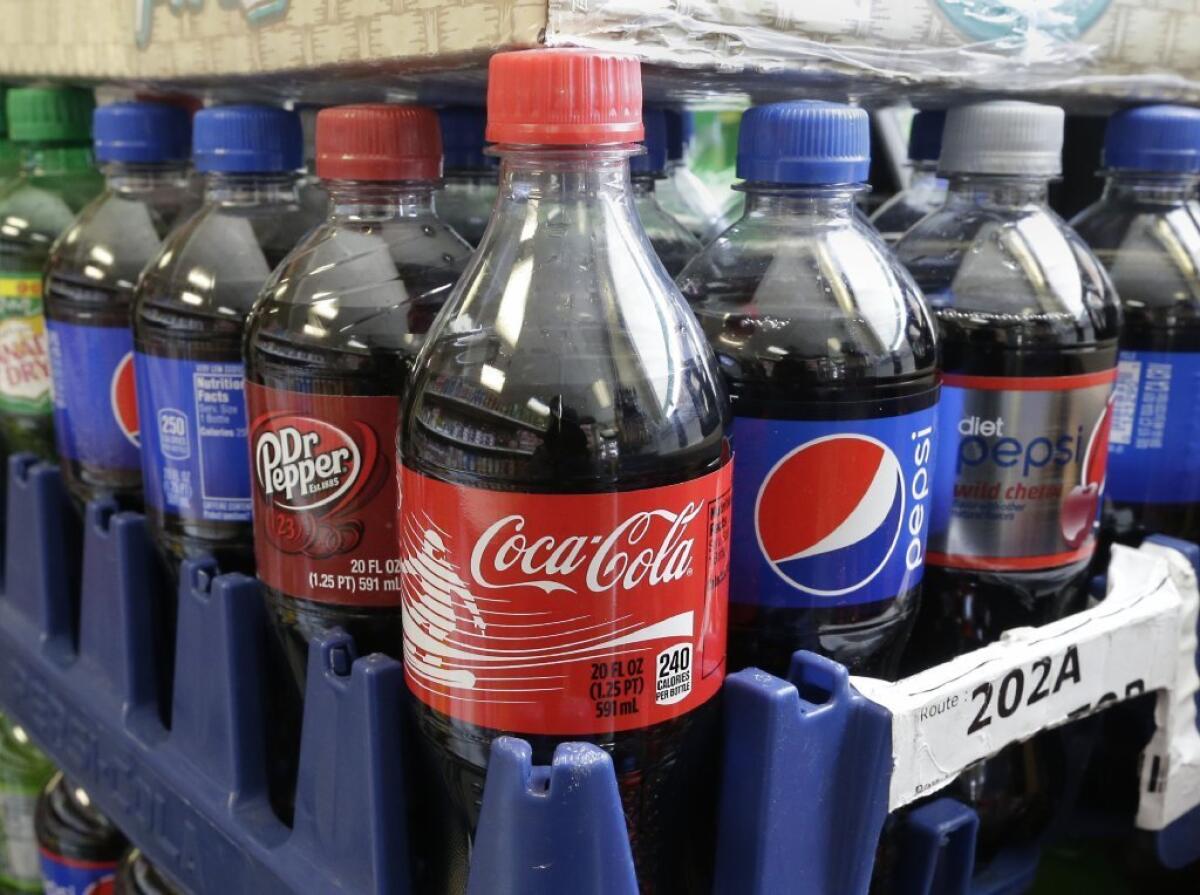California, back off the nanny-state warning labels on sodas

- Share via
Soda consumption is down nationwide, to per capita levels last seen in 1987. It’s even down among kids.
As word gets out about the empty calories in soft drinks, people have been getting the message. Such changes come slowly, but they happen. But other things are happening as well. Teenagers have been replacing their sodas with coffee. And we’re not talking double shots of espresso. They go for the milky, sweetened coffees that, per ounce, contain twice the calories of a Coca-Cola.
Sweetened soft drinks are certainly associated with obesity, and the public doesn’t seem ignorant of the fact. The question for California legislators is whether imposing health warnings on soda bottles and cans, akin to those on packs of cigarettes, is going to affect that obesity rate. With calorie and sugar counts already on their labels, and with the amount of publicity about their nutritional uselessness, the public already seems pretty aware of the problem. It seems uncertain at best that SB 1000, which would require labels warning “drinking beverages with added sugar(s) contributes to obesity, diabetes and tooth decay,” would make an appreciable difference in that awareness.
Just as important is the lack of evidence that reducing soda consumption, for all the links to weight gain, would slim the California waistline. Remember the low-fat craze? Fat has twice as many calories per gram as carbohydrate and protein; the reasoning, logical enough, was that if we sharply dropped fat consumption, we’d all lose weight. The problem was that consumers confused nonfat with non-calorie; they consumed enough excess carbohydrate calories to more than make up the difference. And epidemiological links to obesity are not enough to establish a clear cause and effect.
Sweetened milk with more sugar than soda would be exempted. So would fruit juice with as much sugar and as many calories as soda.
There’s no doubt that people should minimize their consumption of soda. It’s not good for us in all kinds of ways. But this is also true of candy and highly processed grains and a slew of other foods. General overconsumption — the supersized American portion — and lack of activity also play a role in our national weight problem. The soda industry is not a boon to consumer health, but a trade association spokeswoman was right when she said that “obesity is a complex condition that can’t be boiled down to one specific product or ingredient.” In fact, there simply isn’t enough high-quality scientific evidence to support one specific weight-loss method over another.
The common response to such objections is that it can’t hurt to try. But as much as warning labels for cigarettes are justified — though most people probably know about those dangers as well by now — legislators and policymakers should think long and hard, and then think again, before forcing a company that sells a perfectly legal product to then advertise against itself.
Tobacco and soda aren’t comparable, at least not given the current state of the science. Before the U.S. Surgeon General issued the famous warning about smoking some 50 years ago, he convened an expert and balanced panel. They reviewed an overwhelming body of scientific study. The public was not at that point well informed about the dangers of smoking, as it is now about the number and emptiness of the calories in soda. The main warning passed from adults to children at the time was that smoking would stunt one’s growth.
The unique and awful consequences of smoking were abundantly clear, and rates of related diseases have predictably fallen as the country has slowly been quitting the habit. Smoking rates are half what they were at the time of the Surgeon General’s report. Yet even at this level, smoking is such an extraordinary threat to our health that it’s still the nation’s No. 1 cause of preventable death. In addition, there long was a problem with the tobacco industry hiding the dangers of smoking, and it is still secretive about the ingredients. That’s not true of soda. That’s why people are already drinking less soda, without the need for labels.
We should be equally sure about soda’s unique role in obesity, equally certain that reducing consumption of that one product would have a significant impact on reducing mortality, before we start forcing companies to advertise against themselves.
ALSO:
Woody Allen vs. Dylan Farrow, art vs. scandal
Will Philip Seymour Hoffman’s death help us to rediscover privacy?
Valentine’s Day quiz: Which matters more, love, lust or brainpower?
More to Read
Sign up for Essential California
The most important California stories and recommendations in your inbox every morning.
You may occasionally receive promotional content from the Los Angeles Times.











